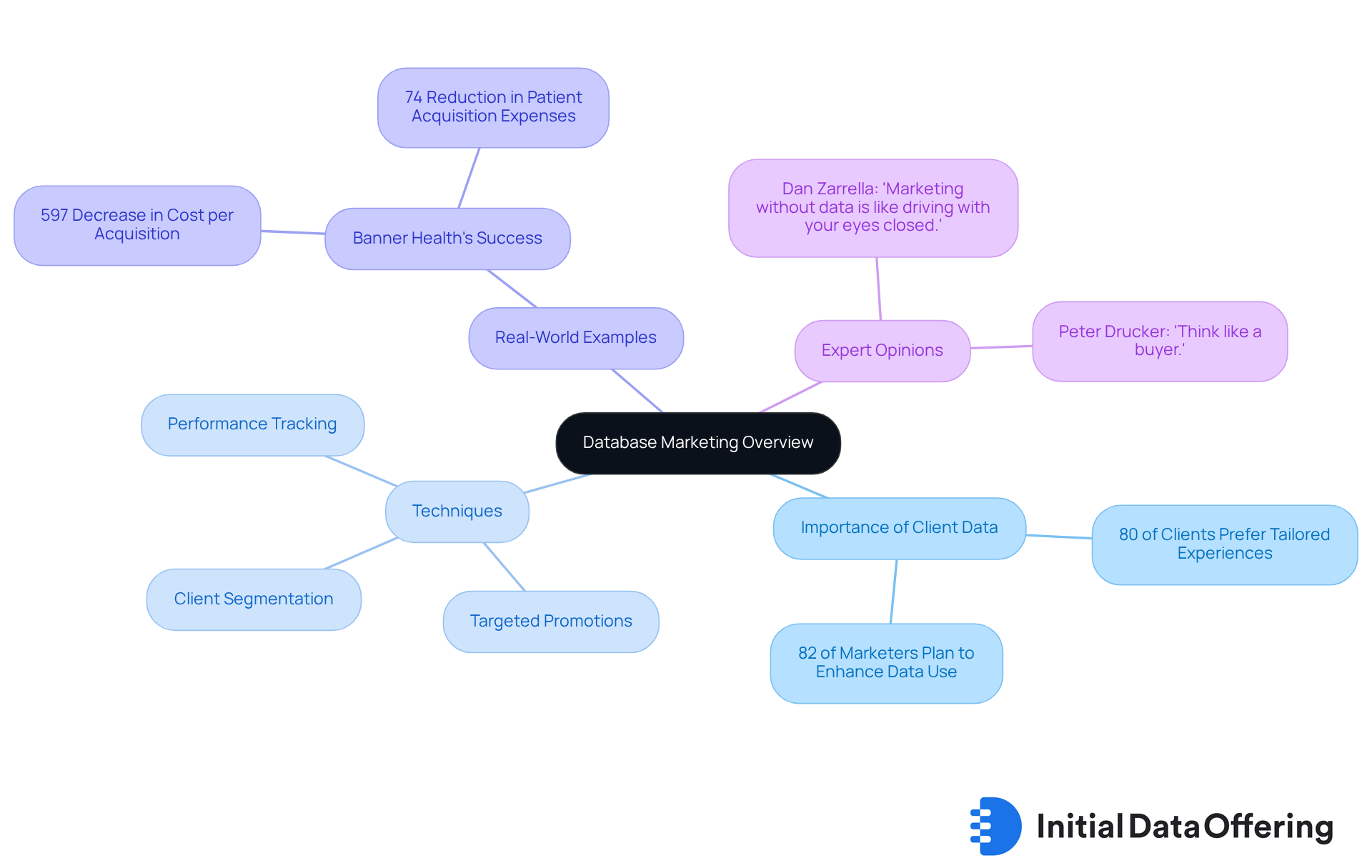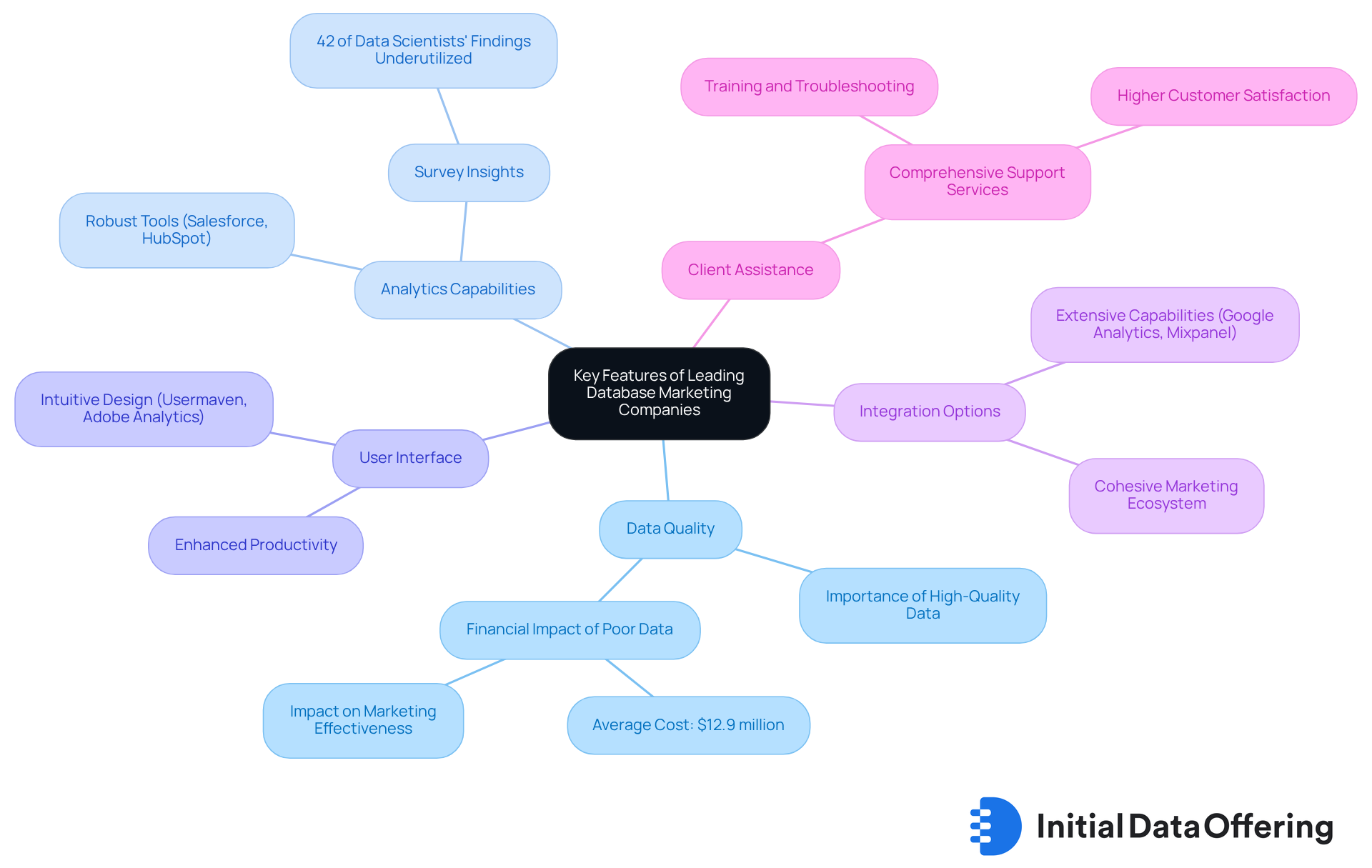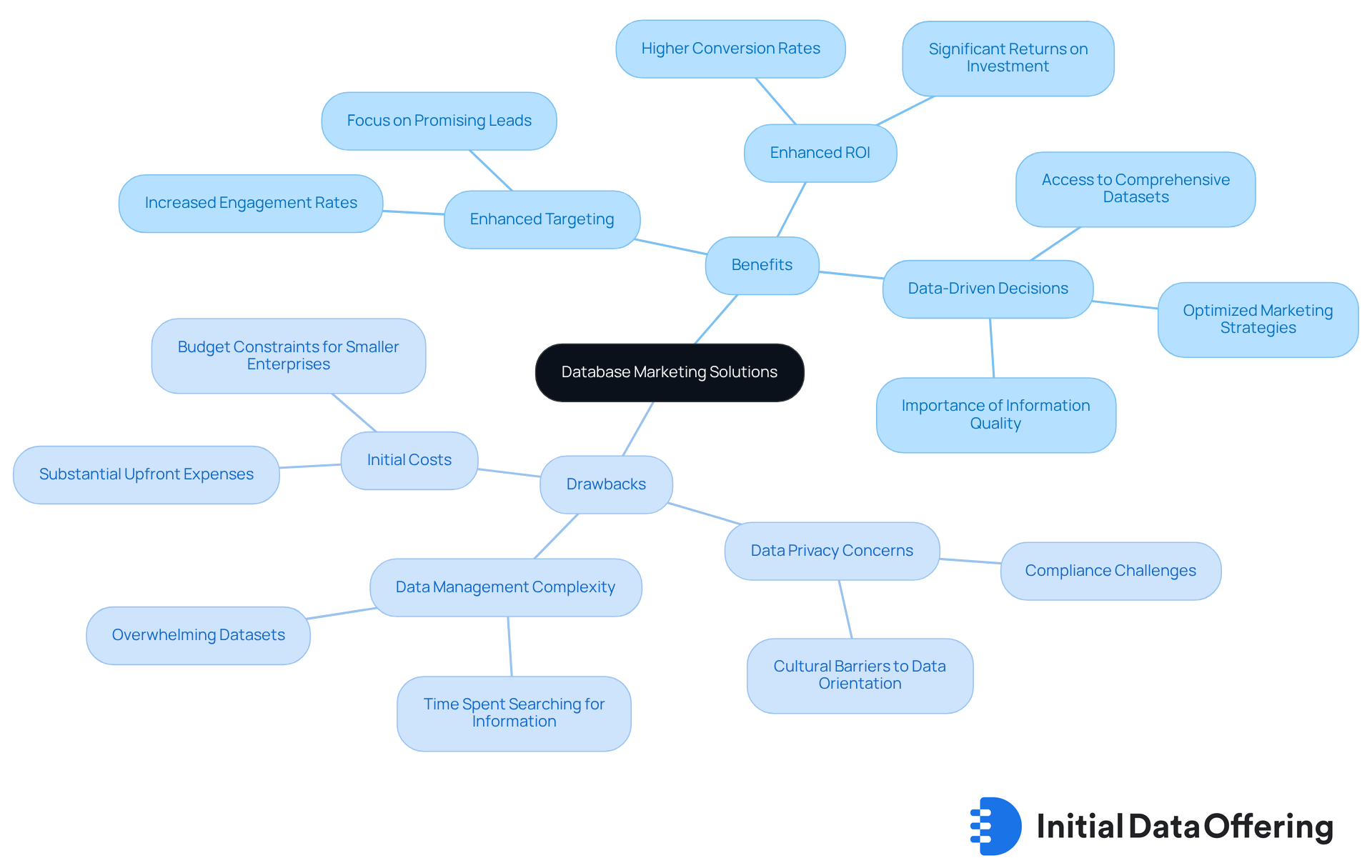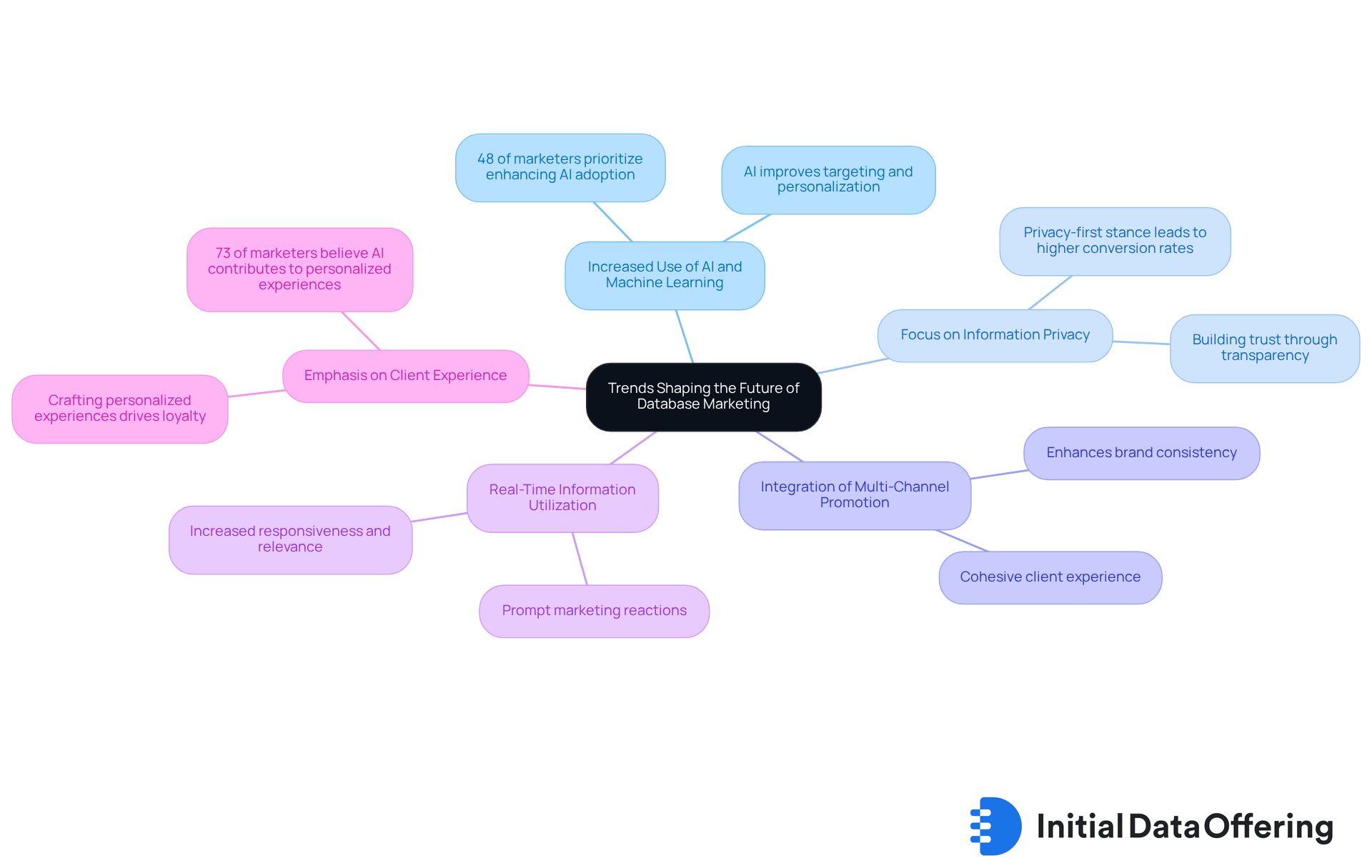Comparing Database Marketing Companies: Key Features & Insights

Comparing Database Marketing Companies: Key Features & Insights
Overview
The article provides a comprehensive comparison of database marketing companies, emphasizing the key features and insights that set leading firms apart in the industry. It highlights the significance of:
- Data quality
- Analytics capabilities
- User interface
- Integration options
- Client assistance
Each of these elements plays a critical role in enabling businesses to make informed decisions and develop effective promotional strategies. By understanding these features, companies can better assess their options and choose the right partner for their marketing needs.
What implications do these insights have for your business's marketing approach?
Introduction
In an era where personalized marketing strategies are essential, database marketing companies are at the forefront, harnessing the power of consumer data to drive engagement and conversion. These firms utilize advanced analytics and segmentation techniques to tailor marketing efforts, ensuring that messages resonate with target audiences. The unique advantages they offer include:
- Improved customer insights
- Enhanced targeting capabilities
- Higher conversion rates
However, as organizations increasingly rely on data-driven approaches, they face significant challenges and complexities in navigating this rapidly evolving landscape. What obstacles do they encounter, and how can they effectively leverage data to optimize their marketing strategies?
Understanding Database Marketing: An Overview
Database marketing companies utilize database promotion as a strategic method that leverages client data to create tailored promotional campaigns. By analyzing consumer behavior and preferences, businesses can customize their messaging to specific audience segments, significantly enhancing engagement and conversion rates. This approach not only strengthens client connections but also boosts sales by ensuring that promotional efforts are relevant and timely.
In 2025, the significance of client information in promotional campaigns is underscored by the fact that:
- 80% of clients are more inclined to purchase from brands that provide tailored experiences.
- 82% of marketers plan to enhance their use of first-party data, highlighting the growing trend in data utilization that emphasizes the importance of client information in promotional strategies.
Effective database promotion encompasses various techniques, including:
- Client segmentation
- Targeted promotions
- Performance tracking
All aimed at maximizing return on investment (ROI).
Real-world examples illustrate the effectiveness of tailored advertising. For instance, healthcare organizations like Banner Health have successfully employed data-driven strategies to enhance patient acquisition, achieving an impressive 597% decrease in cost per acquisition through targeted social media campaigns. Additionally, they experienced a 74% reduction in patient acquisition expenses across all divisions, demonstrating how database strategies can improve audience engagement rates by delivering customized content that resonates with viewers.
Statements from industry experts further emphasize the critical role of client information in promotion. Dan Zarrella aptly states, 'Promoting without information is like driving with your eyes closed,' highlighting the necessity of insight-driven approaches in developing effective promotional strategies. Furthermore, Peter Drucker advises us to 'Think like a buyer,' stressing the importance of understanding buyer perspectives in database promotion.
As companies navigate the complexities of the digital landscape, the integration of client information into promotional strategies by database marketing companies remains essential for achieving a competitive edge and fostering lasting customer loyalty. Moreover, adherence to privacy protection regulations is vital in ensuring that promotional strategies are both effective and responsible.

Comparing Key Features of Leading Database Marketing Companies
In the competitive landscape of database marketing companies, several key features distinguish leading firms, each offering unique advantages and benefits for effective promotion.
-
Data Quality is paramount. Platforms like Initial Data Offering (IDO) highlight the necessity of high-quality datasets, ensuring users access accurate and relevant information. IDO employs its AI-driven Recursive Data Engine to continuously grow and enhance a dynamic graph of 265 million global entities, providing businesses with trustworthy information essential for effective marketing. This focus on information quality is critical, as flawed data can cost organizations an average of $12.9 million annually, significantly impacting marketing effectiveness.
-
Analytics Capabilities play a crucial role in interpreting data effectively. Companies such as Salesforce and HubSpot provide robust analytics tools that empower organizations to derive actionable insights, thereby improving decision-making processes. A survey revealed that 42% of data scientists felt their findings were not utilized by decision-makers, underscoring the need for effective analytics integration.
-
A User Interface that is intuitive is vital for ease of use. Platforms like Usermaven and Adobe Analytics are noted for their user-friendly designs, which facilitate smoother navigation and tool utilization by marketers. This ease of use can enhance productivity and foster better engagement with the platform.
-
Integration Options represent a significant advantage. Companies like Google Analytics and Mixpanel offer extensive integration capabilities, enhancing their functionality and enabling businesses to establish a cohesive marketing ecosystem. How well do your tools integrate with each other?
-
Finally, Client Assistance can greatly influence user experience. Organizations that provide comprehensive support services, including training and troubleshooting, often achieve higher customer satisfaction rates. For instance, companies that invest in high-quality data management solutions frequently report improved operational efficiency and reduced time spent on data hygiene tasks.
By concentrating on these essential attributes, companies can make informed decisions when selecting database marketing companies that align with their strategic objectives.

Evaluating Benefits and Drawbacks of Database Marketing Solutions
Evaluating the benefits and drawbacks of database marketing solutions reveals important insights:
-
Benefits:
- Enhanced Targeting: Database marketing enables precise targeting of customer segments. This results in engagement rates that can increase by up to 28% when tailored to specific accounts. Such a targeted approach allows businesses to focus their resources on the most promising leads, significantly improving conversion rates.
- Enhanced ROI: Companies that employ strategies from database marketing companies report a 25% increase in the conversion rate from qualified leads to sales-accepted leads. This emphasis on high-potential clients can yield returns on investment that are 10 times greater than conventional promotional techniques.
- Data-Driven Decisions: Access to comprehensive datasets empowers organizations to make informed decisions, optimizing their marketing strategies. However, it is noteworthy that merely 20% of analytics insights are anticipated to produce business results. This highlights the significance of information quality and literacy in maximizing effectiveness.
-
Drawbacks:
- Data Privacy Concerns: With increasing regulations surrounding data privacy, companies face complex compliance challenges. A significant 67% of analytics leaders identify organizational culture as a barrier to becoming data-oriented, complicating adherence to these regulations.
- Data Management Complexity: Managing extensive datasets can be overwhelming, necessitating sophisticated tools and expertise. It is common for individuals to allocate 60% to 80% of their time searching for information, which can lead to productivity declines and hinder efficient promotional implementation.
- Initial Costs: Implementing a robust database promotional system can involve substantial upfront expenses, potentially deterring smaller enterprises from adopting these solutions. Despite the potential for high ROI, 37% of marketers struggle to secure the necessary budget and resources for effective implementation.
In summary, while database marketing companies offer enhanced targeting and improved ROI, organizations must navigate significant challenges related to privacy, management complexity, and initial investment costs.

Trends Shaping the Future of Database Marketing
Several trends are shaping the future of database marketing:
-
Increased Use of AI and Machine Learning: Companies are leveraging AI to analyze data more efficiently and predict customer behavior, enhancing targeting and personalization. Significantly, 48% of marketers prioritize enhancing AI adoption as a goal, reflecting the technology's increasing significance in promotional strategies. This shift not only streamlines processes but also improves customer engagement, ultimately leading to better marketing outcomes.
-
Focus on Information Privacy: As regulations become stricter, businesses are emphasizing information privacy and transparency, which will affect how they gather and utilize client information. A privacy-first stance can result in higher conversion rates for businesses, highlighting the significance of privacy in promotional effectiveness. By prioritizing privacy, companies can build trust with their customers, which is essential in today’s market.
-
Integration of Multi-Channel Promotion: The future of database promotion will see a greater emphasis on integrating various promotional channels, allowing for a more cohesive client experience. This integration not only enhances brand consistency but also improves customer journey mapping, making it easier for businesses to reach their audience effectively.
-
Real-Time Information Utilization: The capacity to utilize real-time information for prompt marketing reactions will become progressively significant, allowing companies to connect with clients at the optimal moment. This agility in marketing can lead to increased responsiveness and relevance, which are crucial for maintaining competitive advantage.
-
Emphasis on Client Experience: Companies will concentrate on crafting personalized experiences based on client information, driving loyalty and retention. In fact, 73% of marketers believe AI contributes significantly to personalized customer experiences. By focusing on the client experience, businesses can foster deeper connections and encourage repeat engagement.
As companies navigate these trends, they must also tackle the challenges presented by algorithm bias and privacy to ensure responsible and effective marketing practices. Regularly testing and analyzing AI data is necessary to mitigate bias, ensuring ethical considerations are prioritized. This proactive approach not only safeguards the integrity of marketing efforts but also enhances overall effectiveness.

Conclusion
Database marketing companies play a pivotal role in harnessing client data to create personalized promotional strategies. This article has explored the various dimensions of database marketing, emphasizing its importance in enhancing customer engagement and driving sales. By leveraging consumer insights, businesses can tailor their marketing efforts, ultimately achieving higher conversion rates and fostering lasting connections with their audience.
Key features of leading database marketing companies include:
- Data quality
- Robust analytics capabilities
- User-friendly interfaces
- Integration options
- Comprehensive client support
Each of these attributes contributes significantly to the effectiveness of promotional strategies, allowing organizations to make informed decisions that align with their goals. The advantages of enhanced targeting and improved return on investment are substantial, yet they are counterbalanced by challenges such as data privacy concerns and management complexity, which must be navigated carefully.
As the landscape of database marketing continues to evolve, embracing trends such as AI integration, a focus on information privacy, and a commitment to client experience will be essential for success. Companies must remain agile and responsive to changes in consumer behavior and regulatory environments to maintain a competitive edge. By prioritizing these aspects, businesses can not only enhance their marketing effectiveness but also build trust and loyalty among their customers, ensuring long-term success in an increasingly data-driven world.
Frequently Asked Questions
What is database marketing?
Database marketing is a strategic method used by companies to leverage client data for creating tailored promotional campaigns. It involves analyzing consumer behavior and preferences to customize messaging for specific audience segments, enhancing engagement and conversion rates.
Why is client information important in promotional campaigns?
Client information is crucial because 80% of clients are more likely to purchase from brands that offer tailored experiences. Additionally, 82% of marketers plan to enhance their use of first-party data, indicating the growing trend of data utilization in promotional strategies.
What techniques are included in effective database promotion?
Effective database promotion includes techniques such as client segmentation, targeted promotions, and performance tracking, all aimed at maximizing return on investment (ROI).
Can you provide an example of successful database marketing?
Yes, healthcare organizations like Banner Health have successfully used data-driven strategies to enhance patient acquisition, achieving a 597% decrease in cost per acquisition through targeted social media campaigns and a 74% reduction in patient acquisition expenses across all divisions.
What do industry experts say about the role of client information in promotion?
Industry experts emphasize the importance of client information in promotion. Dan Zarrella states, "Promoting without information is like driving with your eyes closed," while Peter Drucker advises to "Think like a buyer," highlighting the need to understand buyer perspectives in database promotion.
Why is it important for companies to integrate client information into their promotional strategies?
Integrating client information into promotional strategies is essential for achieving a competitive edge and fostering lasting customer loyalty in the complex digital landscape.
What is the significance of privacy protection regulations in database marketing?
Adherence to privacy protection regulations is vital to ensure that promotional strategies are not only effective but also responsible, maintaining consumer trust and compliance with legal standards.